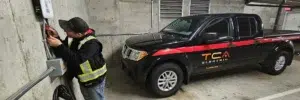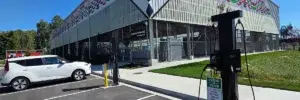Smart Tech Emerges as an Efficient, Cost-Effective Commercial EV Charging Solution
Canada’s drivers have readily adopted the electric vehicle revolution, but lately the focus has shifted from individual consumers to electrifying entire fleets. For businesses, the best commercial EV charging solutions are those that align with their logistics and business goals, providing convenient charging at the right time and with cost-effective solutions.
Recently, new technologies like energy storage systems, vehicle-to-grid technologies, and smart charging have made the fleet EV charging easier than ever for businesses in Vancouver to adopt. TCA Electric is breaking down how companies looking to electrify can get the best results.
Why Commercial EV Charging Solutions Must Be Smarter
EV charging for businesses is very different from the needs of individual drivers. There are two main reasons for this:
- Timing of charging needs – overnight and all at once vs. on-demand
- Power consumption – larger vehicles running on daily cycles
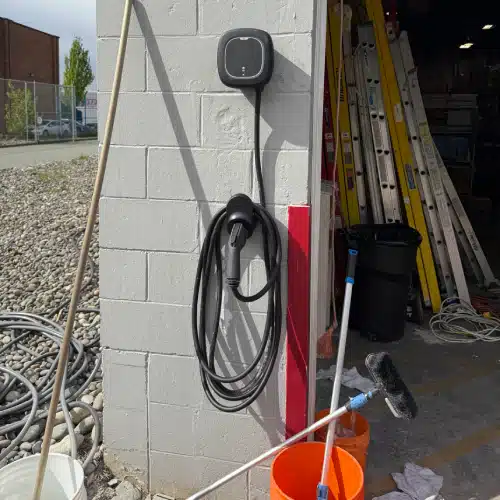
Timing: Overnight Fleet Charging Efficiency
Residential EV drivers expect convenience above all. They hope to charge their vehicles whenever they get home, which could be just about any time of the day. When charging a commercial fleet, however, all vehicles must be fully charged and ready to go by the next morning.
Companies that rely on fleets of vehicles each day must charge overnight to be ready for the next day’s routes. That concentrated charging window means systems must be reliable, efficient, and designed to deliver high power fast.
Higher Power Demands for Commercial Vehicles
Company vehicles draw more energy than most consumer cars. Think of Amazon’s delivery vans, the new GM BrightDrop, or the various trucks and vans that may be used by trades businesses like ours—or our recent client, Belfor. These vehicles must cover large amounts of ground and carry significant loads of materials or goods.
All of that adds up to greater power demands and infrastructure challenges, and it’s where depending entirely on the energy grid can be problematic.
How ESS Supports Smart Charging
The demands of EV fleet charging are a challenge, but energy storage systems, or ESS, support smart charging technologies to help businesses meet their needs. With an ESS, businesses can:
- Avoid costly infrastructure upgrades by storing power
- Make efficient use of BC Hydro’s grid
- Open the door to microgrid and nanogrid possibilities
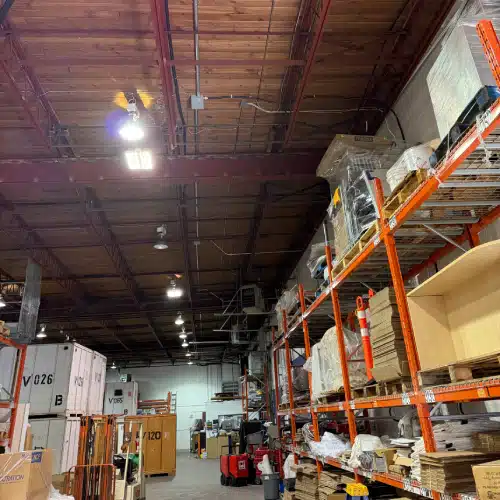
Avoiding Infrastructure Upgrades
Completing service and infrastructure upgrades to accommodate a new EV charging setup is a costly and time-consuming undertaking, though rebates are still available to reduce these overall costs.
Energy storage systems can store power when grid demand is lower or through on-site solar, then provide that power to fleets charging overnight. This allows companies to stay within their existing power limits while still charging their full fleet.
Maximizing BC Hydro’s Grid
The power grid can only handle so much demand, and charging at peak times can be more expensive. However, ESS enables companies to more efficiently consume power.
Further, businesses may be able to sell stored power back to the grid to reduce costs using vehicle-to-grid (V2G) technology and programs. Some programs even pay businesses for signing up, even if their power isn’t used.
Microgrid and Nanogrid Possibilities
ESS also opens the door to microgrid and nanogrid setups. A nanogrid might power a single building or fleet depot independently during outages or high-demand periods. A microgrid goes a step further, linking several buildings or businesses to share power and provide local energy resilience. As adoption of ESS increases, neighbouring businesses may collaborate to avoid outages in their area.
These aren’t futuristic ideas—they’re already being piloted. Our work with Belfor in Vancouver is one example of how businesses are taking charge (literally) of their own energy.
What This Means for Other Businesses
Many types of businesses can benefit from this model of commercial EV charging:
- Logistics and delivery companies using fleet vans
- Construction and trades with work trucks returning to base at night
- Service companies with centralized vehicle depots
- Any business looking to reduce energy costs and future-proof operations
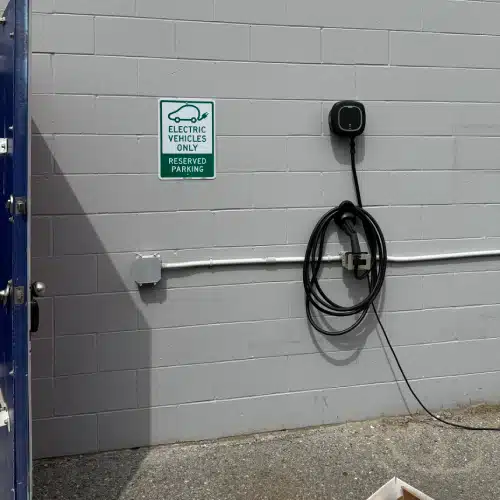
Getting started is simple: reach out to TCA Electric, Vancouver’s trusted experts in smart commercial EV charging stations and fleet charging systems. During a consultation with our team, we’ll assess your needs, evaluate your power infrastructure, and complete a full site assessment to develop a comprehensive charging plan for your business that maximizes efficiency while minimizing out-of-pocket expenses.
Ready to get started? Book an appointment with our team today.
Frequently Asked Questions About Commercial EV Charging Solutions
How does smart charging work for commercial EV fleets?
Smart charging uses programmable systems to deliver electricity at optimized times—usually overnight—based on your fleet’s schedule and your energy rates. This can lower costs and reduce grid strain.
Do I need to upgrade my electrical infrastructure for EV charging?
Not always. With energy storage systems (ESS), businesses can often avoid major upgrades by storing off-peak energy and distributing it during charging hours.
What incentives are available in Vancouver for commercial EV charging?
BC Hydro, CleanBC, and Natural Resources Canada all offer rebates for charging stations, ESS, and other green tech. TCA Electric helps clients secure available incentives during planning.


